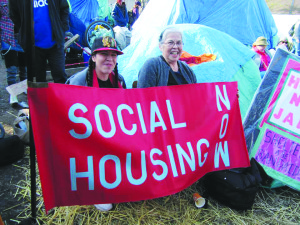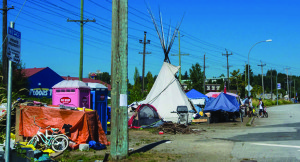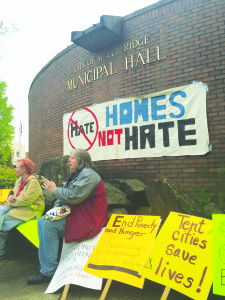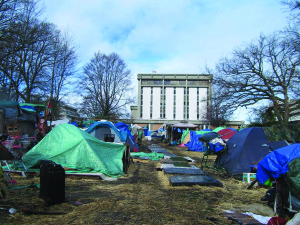
When “rights” are not enough – Lessons from Tent City Resistance
 It felt like a major victory when, this spring, the courts refused to grant an injunction to the Provincial government to remove Super InTent City (SIC) from the lawn of the Victoria court house. Never before has a Canadian court refused a state injunction to displace homeless people. Adding to this significance was a sense of momentum: this was the third of a string of recent legal decisions that advance homeless peoples’ legal right to occupy public space. But with each advance, the state seems to adapt and finds new ways to penalize and control homeless people: cities are passing new tenting bylaws that more strictly define the ways homeless people can and cannot be in public, the Province is increasing social worker supervision of people on the street, and an anti-homeless hate mob is emerging from the shadows. Despite legal victories, homeless peoples’ lives aren’t really getting better, and homelessness might actually be entrenching as a permanent part of cities and towns in Western Canada. So what are court battles worth? What is the role of legal strategies in a broader tent cities movement?
It felt like a major victory when, this spring, the courts refused to grant an injunction to the Provincial government to remove Super InTent City (SIC) from the lawn of the Victoria court house. Never before has a Canadian court refused a state injunction to displace homeless people. Adding to this significance was a sense of momentum: this was the third of a string of recent legal decisions that advance homeless peoples’ legal right to occupy public space. But with each advance, the state seems to adapt and finds new ways to penalize and control homeless people: cities are passing new tenting bylaws that more strictly define the ways homeless people can and cannot be in public, the Province is increasing social worker supervision of people on the street, and an anti-homeless hate mob is emerging from the shadows. Despite legal victories, homeless peoples’ lives aren’t really getting better, and homelessness might actually be entrenching as a permanent part of cities and towns in Western Canada. So what are court battles worth? What is the role of legal strategies in a broader tent cities movement?
![victoria copy]() Fighting the new poor laws
Fighting the new poor laws
The current legal fight for homeless peoples’ right to shelter in public spaces began in 2008 with the “Adams” court case in Victoria. The Adams decision allowed people to erect temporary shelter in public parks when no other forms of shelter exist. Although the judge was not specific about the meaning of ‘temporary,’ Victoria passed bylaws that interpreted the ruling to limit camping in its parks from 7pm-7am. Last year in Abbotsford, homeless people launched a legal challenge for the right to set up temporary shelter in a park. Part of the resulting legal decision of the Abbotsford “Shantz” case was that the courts imposed specific time limits on camping; tents could only be up from 7pm to 9am, which seemed to affirm Victoria’s restrictive interpretation of the Adams decision. The City of Abbotsford used the Shantz ruling to effectively break up the long-standing Dignity Village tent city on Gladys Ave.
In his ruling on the Abbotsford tent city court case, Chief Justice Hinkson recognized physical and mental exhaustion, loss of belongings, and vulnerability to violence and discrimination as harms that make nighttime anti-camping bylaws unconstitutional. But homeless people say that the new bylaws that limit camping to overnight hours have basically the same harms. Tent city leader Mama Bear said homeless people started Maple Ridge’s camp in the spring of 2015 because “every morning bylaw officers came and made us pack up our tents” and she was exhausted by “carrying our stuff around all day” waiting for night to fall to set up again. That means Maple Ridge bylaw officers were enforcing nighttime-only camping even before the law changed. And Super InTent City in Victoria formed after the Shantz decision precisely because of daily harassment from police and bylaw officers who allowed homeless people to sleep in parks at night but pushed them out every morning. Camping laws, whether permitting certain times for public sleeping or prohibiting camping altogether, are frameworks for regulating homeless people in public. Rather than guarantees of homeless peoples’ rights, camping laws are poor laws that protect public space against homeless people.
 “Poor laws” are not new, and they have always adapted to changing political climates. Between confederation and the 1960s, Canada’s Vagrancy laws policed and criminalized poverty, drug trade and sex work by making it a criminal code offense to be poor in public. After they were overturned, Provinces and Municipalities created replacement poor laws like those that restrict camping. Today, these new poor laws are proving to be very adaptive and insistent on criminalizing low-income people. While court battles may bring us some victories against the language of specific laws, they have not broken the poor-bashing principles that underlie them.
“Poor laws” are not new, and they have always adapted to changing political climates. Between confederation and the 1960s, Canada’s Vagrancy laws policed and criminalized poverty, drug trade and sex work by making it a criminal code offense to be poor in public. After they were overturned, Provinces and Municipalities created replacement poor laws like those that restrict camping. Today, these new poor laws are proving to be very adaptive and insistent on criminalizing low-income people. While court battles may bring us some victories against the language of specific laws, they have not broken the poor-bashing principles that underlie them.
Hate & Social Work: The state’s other tools in its war on the poor
When Super InTent City beat the Province’s injunction, the decision muted the power of police to break up the homeless community. But nearly right away, the poor-bashing ideas that underlay and justified those laws came into view, in the form of an anti-homeless hate mob. In Victoria they called themselves “Mad As Hell” and in Maple Ridge they’re “Ridgeilantes.” Their main demands are to restore and aggressively enforce the laws that regulate public space in order to keep property-owning, white, Canadian society in control. This means there is a strong connection between public anti-poor sentiment and the new poor laws; we cannot face one without facing the other.
 Alongside the anti-homeless hate movement, the government also quickly responded with new extra-legal governing policies. When the law failed to police and displace residents of SIC, the Provincial government hired the Portland Hotel Society, a non-profit housing and social service provider, to manage the camp. Residents of SIC quickly recognized that social worker management would make it harder for homeless people to use tent cities as spaces of resistance to the new poor laws, because they would no longer be a self-determined and self-governed base for a renewed housing justice movement. SIC has responded to this new challenge by organizing a council of representatives that is negotiating resources from the Province and fighting to manage the Province’s managers. The danger posed by social service management is that rather than being temporary, politicized spaces to fight to end homelessness, tent cities could become government-funded, open-air, ‘lowest-barrier’ shelters that modify and manage homelessness. With the courts imposing limits on police displacement of the tent city, the Province is turning to the social service sector to discipline the poor.
Alongside the anti-homeless hate movement, the government also quickly responded with new extra-legal governing policies. When the law failed to police and displace residents of SIC, the Provincial government hired the Portland Hotel Society, a non-profit housing and social service provider, to manage the camp. Residents of SIC quickly recognized that social worker management would make it harder for homeless people to use tent cities as spaces of resistance to the new poor laws, because they would no longer be a self-determined and self-governed base for a renewed housing justice movement. SIC has responded to this new challenge by organizing a council of representatives that is negotiating resources from the Province and fighting to manage the Province’s managers. The danger posed by social service management is that rather than being temporary, politicized spaces to fight to end homelessness, tent cities could become government-funded, open-air, ‘lowest-barrier’ shelters that modify and manage homelessness. With the courts imposing limits on police displacement of the tent city, the Province is turning to the social service sector to discipline the poor.
Rights are not enough
Struggles in the courts have produced some partial victories in undoing the new poor laws, but new rights have not been enough to make public space available to homeless people. An important lesson of our fight against the poor laws is that the courts cannot be the main strategy of our movement. They can be part of our struggle, but the centre of the movement must be the point where we can see the poor laws, anti-poor sentiment, and social service management all at once and not compromise the lives of low-income people for any single part of that overall fight. The ground-level of the tent cities resistance movement is where we fight the laws, ideology and economy that oppress and kill low-income people, and it is where we can build our independent social power.

 Fighting the new poor laws
Fighting the new poor laws